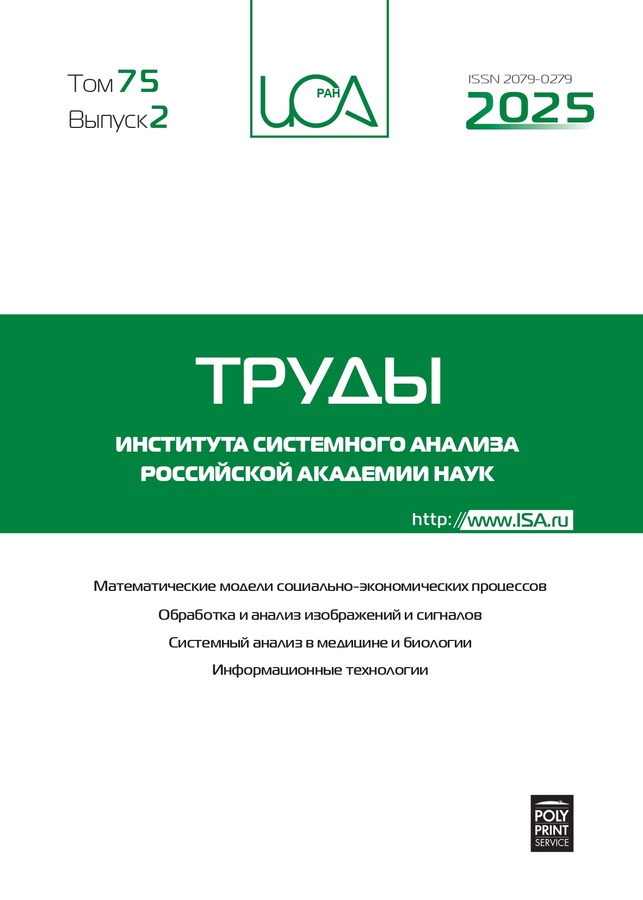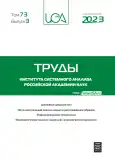Разработка формального аппарата для описания и обработки концептуальных моделей
- Авторы: Хтве Н.Н.1, Волкова Г.Д.1, Григорьев О.Г.2
-
Учреждения:
- Московский государственный технологический университет «СТАНКИН»
- Федеральное государственное учреждение «Федеральный исследовательский центр «Информатика и управление» Российской академии наук»
- Выпуск: Том 73, № 3 (2023)
- Страницы: 40-51
- Раздел: Информационные технологии
- URL: https://bakhtiniada.ru/2079-0279/article/view/287280
- DOI: https://doi.org/10.14357/20790279230305
- ID: 287280
Цитировать
Полный текст
Аннотация
В статье представлено формальное описание концептуальной модели 1-го рода на объектном и конкретном уровнях для предметной задачи, представляющей документированные технические знания с учетом различной степени их формализации и расслоения концептуальной модели под постоянную информацию.
Об авторах
Ньи Ньи Хтве
Московский государственный технологический университет «СТАНКИН»
Email: sawnyinyi90@yandex.ru
Аспирант
Россия, МоскваГалина Дмитриевна Волкова
Московский государственный технологический университет «СТАНКИН»
Автор, ответственный за переписку.
Email: cog-par@yandex.ru
Заведующий кафедрой, доктор технических наук, профессор
Россия, МоскваОлег Георгиевич Григорьев
Федеральное государственное учреждение «Федеральный исследовательский центр «Информатика и управление» Российской академии наук»
Email: oleggpolikvart@yandex.ru
Главный научный сотрудник, доктор технических наук
Россия, МоскваСписок литературы
- Волкова Г.Д. Методология автоматизации интеллектуального труда. М.: Янус-К. 2013. 104 с.
- Волкова Г.Д. Концептуальное моделирование проектных задач: учеб. Пособие М.: ФГБОУ ВО«МГТУ «СТАНКИН». 2016. 117 с.
- Лаврёнова О.А. Моделирование семантики научно-технических текстов для АИС и его теоретические основы // Труды 8-ой Всероссийской научной конференции «Электронные библиотеки: перспективные методы и технологии, электронные коллекции» RCDL’ 2006. Суздаль. Россия. 2006.
- Лукашевич Н.В. Тезаурусы в задачах информационного поиска // М.: МГУ. 2011. 495 с.
- Кара-Ушанов В.Ю. Модель «Сущность – Связь»: учеб. пособие //Екб.: Электронное текстовое издание. 2017. 64 с.
- Пинягина О.В. Лекции «Базы Данных»: ER-модель (entity–relationship) // [Электронный ресурс]. URL: http://kek.ksu.ru/EOS/BD/ER_model. html/ (доступ 12.10.2019).
- Методология IDEF1X // [Электронный ресурс]. URL: https://www.idef.com/idef1x-data-modeling- method/ . (доступ 12.09.2019).
- Марка Д., МакГоуэн К. Методология структурного анализа и проектирования SADT // М.: Метатехнология. 1993. 240 с.
- Симаков К.В. Модели и методы извлечения знаний из текстов на естественном языке/ Диссертации на соискание ученой степени кандидата технических наук. Специальность 05.13.17. Москва. 2008.
- Норман Д. Семантические сети // Психология памяти. М.: Че Ро. 2000. C. 350-356.
- Соломатин Н.М. Информационно-семантические системы // М.: Высшая школа. 1989. 127 с.
- Prolog [Электронный ресурс]. URL: https:// en.wikipedia.org/wiki/Prolog/ (доступ 01.04.2021).
- Кузин Е.С. Информационные технологии и проектирование прикладных программных систем // Информационные технологии и вычислительные системы РАН. 1996. № 3.
- Кузин Е.С. Концепции информационной технологии функционально-ориентированного проектирования прикладных информационных систем. // Информационные технологии. 2000. № 1.
- Вагин В.Н., Михайлов И.С. Обеспечение интероперабельности информационных систем на основе подхода метамоделирования и онтологии предметной области // Труды Второй Международной конференции «Системный анализ и информационные технологии». САИТ-2007. Обнинск. Россия. С. 149-152.
- Сидорова Е.А. Подход к моделированию процесса извлечения информации из текста на основе онтологий // Онтология проектирования. 2018. Т.8. №1(27). С. 134-151.
- Описание метода Онтология // [Электронный ресурс]. URL: https://ru.wikipedia.org/wiki/Онтология_(информатика)/ (доступ 18.03.2021).
- Гладун А.Я. Онтологии в корпоративных системах // Корпоративные системы. М.: Комиздат. 2006. С. 13-26.
- Кузнецов О.П., Суховеров В.С. Онтологический подход к оценке тематики научного текста // Онтология проектирования. 2016. Т. 6.№1(19). С. 55-66.
- Бабанов А.М. Два современных подхода к семантическому моделированию – ORM и ERMM // Вестник Томского Государственного университета. 2014. №3(28). С. 46-56.
- Object Oriented Approach // [Электронный ресурс]. URL: https://www.tutorialspoint.com/ system_analysis_and_design/system_analyss_ and_design_object_oriented_approach.html/ (доступ 18.03.2021).
- Грэхем И. Объектно-ориентированные методы. Принципы и практика. М.: Вильяме. 2004. 880 с.
- Леоненков А.В. Объектно-ориентированный анализ и проектирование с использованием UML и IBM Rational Rose. M.: Бином. Лаборатория знаний. 2006. 320 с.
- Ньи Ньи Хтве, Волкова Г.Д. Разработка формального описания типологии статистических предметных ограничений при концептуальном моделировании прикладных задач // Вестник МГТУ «Станкин». 2021. №2(57). С. 13-19.
- Ньи Ньи Хтве, Волкова Г.Д., Тюрбеева Т.Б. Формальное описание классификации и обработки концептуальной модели объектного уровня для предметной задачи // В сборнике: Цифровая экономика: технологии, управление, человеческий капитал. Материалы III всероссийской научно-практической конференции. 2020. С. 73-78.
- Волкова Г.Д, Ньи Ньи Хтве. Формальное описание процедуры обработки концептуальной модели // Материалы XIII всероссийской конференции с международным участием «Машиностроение: традиции и инновации (МТИ – 2020)». Сборник докладов. М.: ФГБОУ ВО«МГТУ «СТАНКИН». 2020. С. 298-305.
- Волкова Г.Д. Философские аспекты моделирования конструкторско-технологических знаний при создании систем автоматизации проектирования в машиностроении // Вестник МГТУ Станкин. 2012. № 1 (19). С. 141-144.
- Тюрбеева Т.Б., Волкова Г.Д., Семячкова Е.Г., Винарская Г.А. Исследование методов классификации и представления знаний в научно-технических публикациях и технической документации // Вестник МГТУ «СТАНКИН». 2018. № 4 (47). С. 168-171.
- Nyi Nyi Htwe, Galina D. Volkova, Tatyana B. Tyurbeeva, Khant Ko Zan. Processing Of Conceptual Models Of Subject Problems For Extracting Knowledge From Technical Documentation // 2021 IEEE Conference of Russian Young Researchers in Electrical and Electronic Engineering (ElConRus), IEEE. 2021. Р. 2185-2189.
- Волкова Г.Д, Ньи Ньи Хтве. Формальное описание классификации и обработки концептуальной модели конкретного уровня для предметной задачи // XXVIII конференция «Математика. Компьютер. Образование. 2021» МКО-2021, 25-30 января 2021 г.: Тезисы докладов. М. 2021. 212. С. 48.
- Волкова Г.Д. Методология автоматизации проектно-конструкторской деятельности в машиностроении // Учебное пособие. М.: МГТУ«Станкин». 2000. 81 с.
Дополнительные файлы










